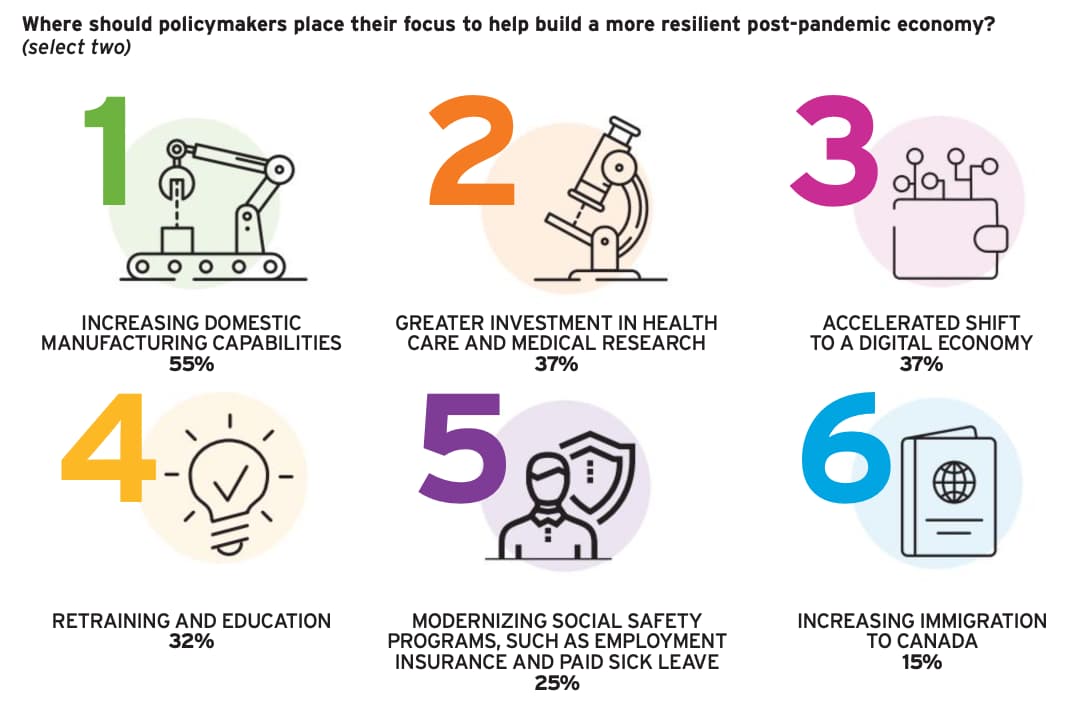Ottawa’s local political and business leaders have done a more effective job at controlling the spread of COVID-19 and positioning the economy for a quick recovery than either the provincial or federal governments, respondents to the Welch LLP Ottawa Business Growth Survey say.
“There’s been frustrations with the federal government around vaccine expectations, and with the provincial government over its mixed messages surrounding public health restrictions,” observes Abacus Data CEO David Coletto. “That same level of frustration hasn’t been there with the local government.”
On the economic front, Coletto notes the federal government implemented several financial support programs in the early days of the pandemic faster than many observers would have thought possible. A year later, however, he suggests that some in the business community are likely to be uncomfortable with the large deficits that the federal Liberals are projected to run in the coming years, even after the economy recovers.
(Sponsored)

OBJ launches the 2026 Executive Report on Cornwall
Cornwall has emerged as one of Eastern Ontario’s most compelling locations for business investment, thanks to a combination of affordability, strategic positioning, and a steadily growing economic base.

Borden Ladner Gervais LLP and partners lead with generosity
Borden Ladner Gervais LLP (BLG) are no strangers to supporting charities in the nation’s capital. From the Boys & Girls Club of Ottawa to Crohn’s and Colitis Canada to the

Opinions on the government’s economic strategy, and the scope of stimulus programs since the start of COVID-19 have been mixed, says Jim McConnery, managing partner at Welch LLP.
“The spring budget included renewed stimulus spending providing ongoing support for the economy, however, the budget did not articulate a plan to eliminate deficits,” he says. “This should be a point of focus in the election campaign with the various parties ideally providing some clarity on their economic platforms. It is also the case that we have some uncertainty with projected economic growth in the light of a fourth wave – this further delays the resumption of normal business activity and day to day life. It is clear that consumers are keen and eager to spend, however, Covid-19 is still a cause for concern.”
A renewed focus on employee well-being
As businesses strive to build back better, leaders will need to look beyond economic recovery.
Employee support programs and mental health initiatives should also be top of mind for employers, according to a leading local business advocate.
The pandemic introduced a host of new stresses that many employees and business owners alike were forced to confront on their own, says Lise Sarazin, director general of Regroupement des gens d’affaires de la Capitale nationale (RGA), an Ottawa-based business advocacy organization.
While it’s difficult for policymakers to design financial or other support packages that meet all the diverse needs of companies in different sectors, virtually all businesses have one thing in common: employees. This is where leaders should be focusing their efforts, argues Sarazin.
“Businesses will be relying on their HR departments more than ever to find solutions to deal with stress, anxiety and depression,” she says. “They will need outside support to ensure they can manage that workload.”
Elsewhere, businesses will also be relying on government leaders to advocate for better external market access, says Sueling Ching, president and CEO of the Ottawa Board of Trade.

In Canada, business owners are calling for less interprovincial trade barriers to make it easier for them to create partnerships and access a broader customer base.
Local retailers are also looking beyond the country’s borders to access the international market.
“Businesses will be looking at how they can amplify, diversify and scale up their sales opportunities,” she says. “Accessing external markets will help drive these companies forward.”
Read the full 2021 Welch LLP Ottawa Business Growth Survey report by clicking on the cover below:







